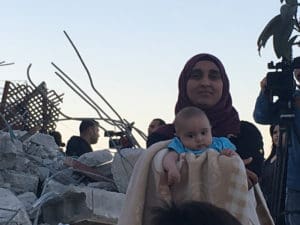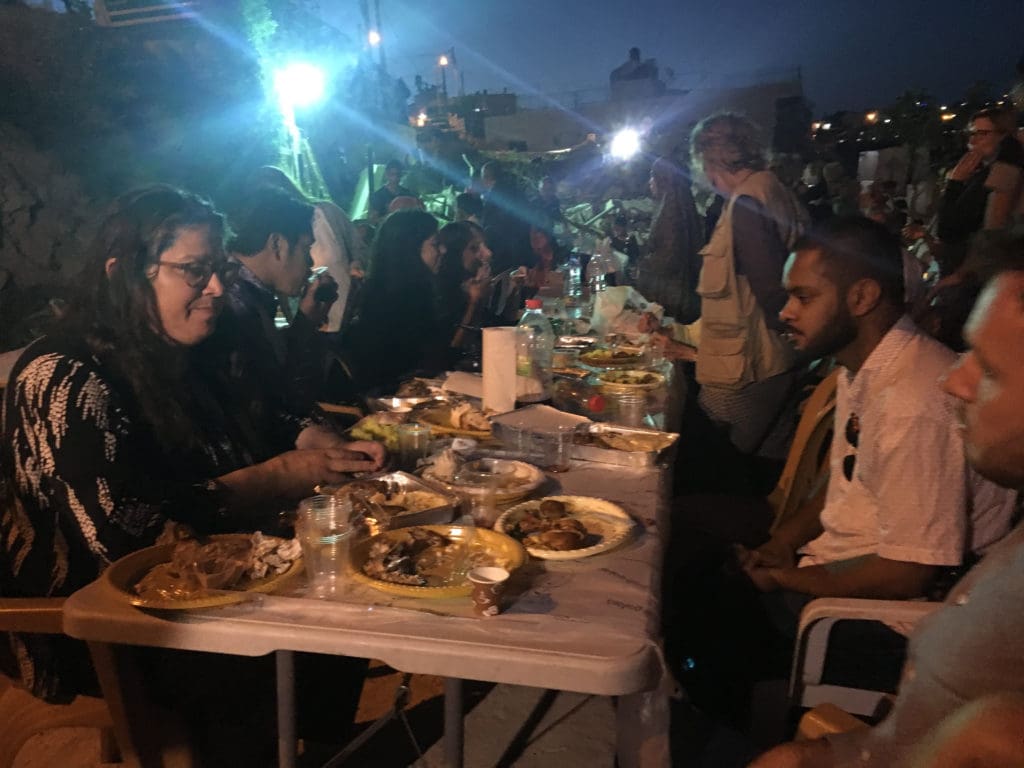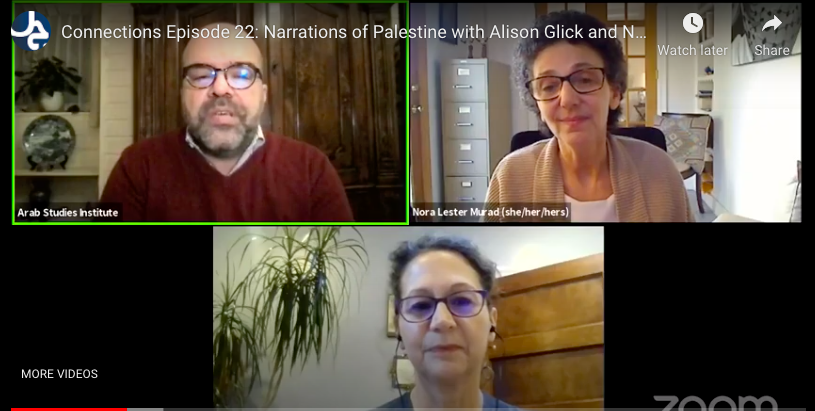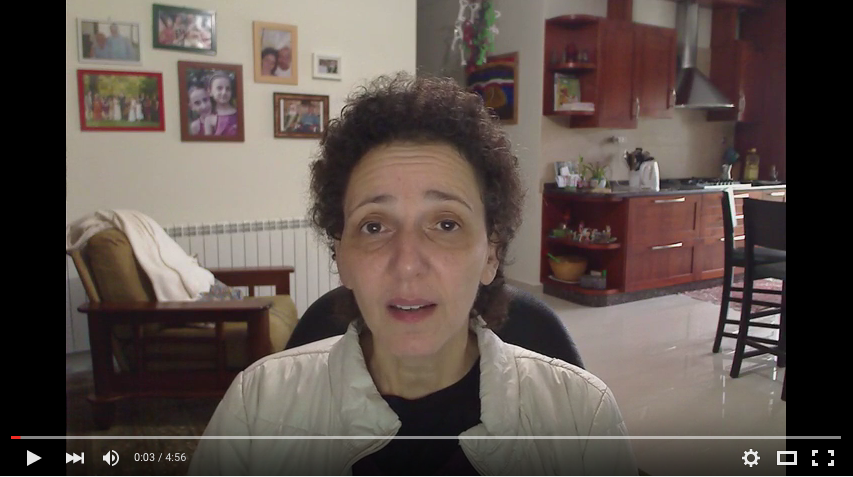This 30-minutes conversation is a warm exchange about the complexities of living in relation to Palestine for Palestinians who live in the diaspora and non-Palestinians who have joined the community (like me!). Aline Batarshe, Executive Director of Visualizing Palestine, Besan Abu-Joudeh, Founder of Build Palestine, and I speak personally about the challenges and joys of staying being part of the Palestinian struggle for visibility, dignity and rights in the United States.
Podcast: Mouin Rabbani interviews Nora Lester Murad & Alison Glick on Jadiliyya
Interview on Boston Media Theory with Marcus Breen
Recorded on October 24, 2020. Available at: https://vimeo.com/469881556
Build Palestine’s Social Innovation Summit: Overcoming Donor Dependency
Overcoming donor-dependency: How can philanthropy tackle the root cause? (47 minutes) Note: If you can’t access this video, try using the code “RADICALIMAGINATION” or email me at nora@noralestermurad.com.
Black Lives Matter: Race & Power in Philanthropy and Development
Segal Family Foundation sponsored #FutureSummit2020, “…a space where we invite our diverse global community of change leaders to deconstruct and reshape trends in Africa from all angles.” It was a great honor for me to join this panel with Degan Ali, African Development Solutions; Lori Adelman, Global Fund for Women; and Marie-Rose Romain Murphy, Economic Stimulus Projects for Work and Action in Haiti. It was recorded on October 1st. (It’s all good, but FYI I start around 34 minutes.)
The Militarization of Palestinian Aid
When I was still with Aid Watch Palestine, I co-authored an article with Alaa Tartir about the militarization of Palestinian aid. It was published by Reality of Aid and IBON International here and in Arabic here. It was a great honor to have the issue picked up by The Real News Network, whose wonderful Shir Hever interviewed me about the issues. It is 14:46 in English with a transcript of the interview here. Please share if you find it useful, and please comment below or on TRNN so we can get discussion about this critical issue going.
Now in Spanish! See: http://www.rebelion.org/noticia.php?id=237144&titular=militarizaci%F3n-de-la-ayuda-internacional-a-palestina-
Iftar on the rubble
This article was originally published by Mondoweiss here.
My father was a social worker on Los Angeles’ skid row for decades. He felt deeply about the humanity of homeless people, and he did what he could to help each person to have a better life. Herb Lester, my father, saw homelessness as a humanitarian disaster; he saw it as the failure of governments to ensure the well-being of their people. And he felt a responsibility to act.
If my father was still living, he would have been appalled to hear about the demolition of Ashraf and Islam Fawaqa’s home in the Sur Baher neighborhood of Jerusalem. He would have been furious that Israel intentionally and systematically makes Palestinian families homeless.
The demolition of the Fawaqa home on May 4, 2017
I was thinking about my father on June 13 at the “Iftar on the Rubble,” which I organized with my friends at the site of Ashraf and Islam’s demolished home.
We planned the Iftar to show solidarity with Ashraf and Islam, and the tens of thousands of Palestinian families whose homes have been demolished, partially demolished, or sealed, and who live every day under the imminent threat of demolitions by the Israel authorities. I felt compelled not only by the humanitarian instincts I inherited from my father (and mother), but also by my profound disappointment in the United Nations coordinated humanitarian response, a prominent feature of the Jerusalem landscape, but not, in my point of view, an effective one.
Home demolition is not merely an Israeli administrative policy, as it is often presented in the western media. Home demolition is part of Israel’s political strategy to expel Palestinians from any place they want control, often through the establishment of Jewish settlements.
Given the magnitude of the impact of demolitions on Palestinians, I have long felt that the humanitarian sector should do more to fulfill its “protection” mandate. Protection involves reducing vulnerability, and for me, this means humanitarians should provide proactive, robust help to strengthen at-risk communities. Even after demolition, the response of humanitarian organizations is inadequate, bureaucratic, and according to some families, demeaning.
My friends and I felt that the least we could do to show these families–families who are on the frontline of the continuing Nakba–that they have real allies, that they are not alone.
On the night of the Iftar on the Rubble, local and international media were in attendance as Ashraf and Islam Fawaqa talked about the demolition of their home on May 4 and how they now live in limbo on the rubble of the demolition site.

Munir Nusseibeh of the Al Quds Community Action Center, one of Jerusalem’s most prominent lawyers, spoke about how demolitions are increasing and the danger demolition poses to the ability of Palestinians to stay in Jerusalem. Nurredin Amro, whose home was demolished on March 15, talked about his experience. His wife, Nabiha, spoke about the terrible psychological impact the demolition had on their children.
Powerful as it was to hear these families talk about their experiences, I think my father would have agreed that the real accomplishment was the Iftar itself. Muslims break the Ramadan fast at the sunset call to prayer, and that’s when the nearly 75 attendees pulled out the dishes they brought and set them out on long tables the Fawaqas had rented for the occasion. There were grape leaves stuffed by the Domari of Jerusalem, home baked cookies, whole meals contributed by the zakat society, and roasted chicken donated by Jerusalem Hotel and Café La Vie, dried figs and juice and more donated by Tanour Market and Abu Zahra Market. People from different walks of life, Palestinians and international solidarity activists, sat elbow to elbow and ate.
The sun went down and the temperature dropped, but people did not rush to leave. They stayed and talked and talked and talked. In the dim spotlight Ashraf rigged, an unusual mix of human beings enjoyed the cool Jerusalem breeze together on the rubble of the Fawaqa family home.

I felt my father’s presence with us that night in Sur Baher, Jerusalem. Like me, he would have been heartened by this real humanitarianism. It wasn’t programmed. It wasn’t funded. And it wasn’t part of anyone’s three-year plan. It was just people caring for people. And it felt hopeful.
- * * * * * * * *
UPDATE! We got excellent media coverage of the event. Here are some of the links:
Aljazeera Plus 2:09 English subtitles (this one already has 450,000 views!)
Aljazeera Online, 28:56 minutes, Arabic
http://www.aljazeera.net/reportslibrary/pages/69ccf346-e532-43d8-a38f-bbfc75dddb08
Falastin Al-Yoom, 2:24 minutes, Arabic
https://youtu.be/wCW3sx-WCVs
Ma’an Network, 3:07 minutes, Arabic
https://youtu.be/X8uw6Baajxg
Aljazeera, Arabic
http://www.aljazeera.net/news/alquds/2017/6/14/%D8%B9%D8%A7%D8%A6%D9%84%D8%A7%D8%AA-%D9%85%D9%82%D8%AF%D8%B3%D9%8A%D8%A9-%D8%AA%D9%81%D8%B7%D8%B1-%D8%B9%D9%84%D9%89-%D8%A3%D9%86%D9%82%D8%A7%D8%B6-%D9%85%D9%86%D8%A7%D8%B2%D9%84%D9%87%D8%A7
Al-Araby, Arabic
https://www.alaraby.co.uk/society/2017/6/14/إفطار-فوق-الأنقاض-مبادرة-للتضامن-مع-عائلة-المقدسي-أشرف-فواقة
AA Turkish, English
http://aa.com.tr/en/middle-east/palestinians-break-fast-amid-rubble-of-demolished-home/841683
International Solidarity Movement, English
https://palsolidarity.org/2017/06/iftar-on-the-rubble/
In Solidarity with Ashraf Fayadh
Read about Ashraf Fayadh, Palestinian poet sentenced to death in Saudi Arabia here:
Newly Translated: Poems to Read for Ashraf Fayadh on January 14
In solidarity with Ashraf and all cultural workers and activists facing threats to their freedom to speak, I am joining the global reading of Ashraf’s poetry with “The Melancholy of Dough” translated by Tariq al-Haydar.
Update! The death sentence has been removed. Read the story in The Guardian!
Follow Naja at @WhateverInGaza.
(20 min.)
And if you love Najla as much as I do, you may want to see previous conversations we’ve recorded:
July 17, 2014 on ground invasion during #GazaUnderAttack (8 min)
https://www.youtube.com/watch?v=mqcN1EymIco&list=UU3f9es6ASkFcjaaLMP5RvbA
July 13, 2014 Nighttime update on #GazaUnderAttack (20 min)
https://www.youtube.com/watch?v=cW–Nyu6H2U&list=UU3f9es6ASkFcjaaLMP5RvbA
July 11, 2014 update on #GazaUnderAttack (21 min)
https://www.youtube.com/watch?v=3XmTvtoC7AM&list=UU3f9es6ASkFcjaaLMP5RvbA&index=8
July 10, 2014 update on #GazaUnderAttack (14 min)
https://www.youtube.com/watch?v=nmPGsEfCA8o&list=UU3f9es6ASkFcjaaLMP5RvbA
And before the recent escalation:
May 3, 2014 about the beach in Gaza (4 min)
https://www.youtube.com/watch?v=sgbCpD-eAk8&list=UU3f9es6ASkFcjaaLMP5RvbA
April 29, 2014 Even more about electricity (5 min)
https://www.youtube.com/watch?v=uH4eW5mO-r8&list=UU3f9es6ASkFcjaaLMP5RvbA
April 24, 2014 How do women dress in Gaza? (4 min)
https://www.youtube.com/watch?v=WEPnVrxJfBc&list=UU3f9es6ASkFcjaaLMP5RvbA
April 21, 2014 More about electricity in Gaza (7:40 min)
https://www.youtube.com/watch?v=MYDZUoif2Xw
April 18, 2014 Electricity in Gaza (7 min)
https://www.youtube.com/watch?v=z4nDLtLlpSA&list=UU3f9es6ASkFcjaaLMP5RvbA
April 12, 2014 What is the siege on Gaza? (6 min)
https://www.youtube.com/watch?v=8eYvibUTb0w&list=UU3f9es6ASkFcjaaLMP5RvbA
Please comment.

